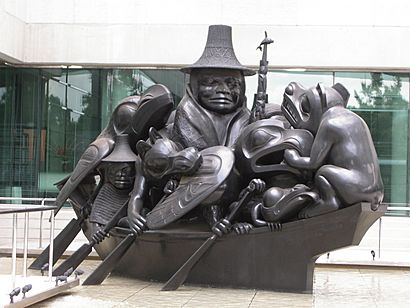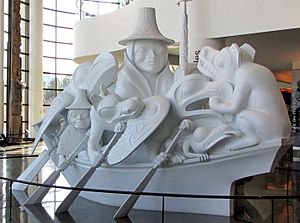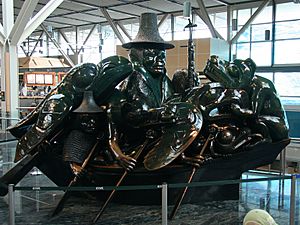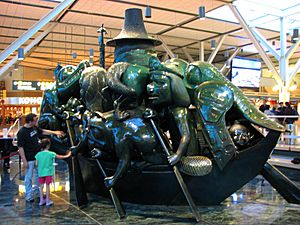Spirit of Haida Gwaii facts for kids
Quick facts for kids The Spirit of Haida Gwaii, the Black Canoe |
|
|---|---|
| outside the Canadian Embassy in Washington, D.C. Photo: Bengt Oberger | |
 |
|
| Artist | Bill Reid |
| Year | 1986 |
| Type | Bronze , plaster |
| Dimensions | 3.89 m × 3.48 m × 6.05 m (12 ft 9 in × 11 ft 5 in × 19 ft 10 in) |
| Location | Canadian Museum of History, Washington, D.C. and Vancouver |
| 38°53′35″N 77°01′06″W / 38.893056°N 77.018333°W | |
The Spirit of Haida Gwaii is a famous sculpture created by Bill Reid (1920–1998). He was a talented artist from the Haida nation in British Columbia, Canada. There are two versions of this amazing artwork: one is called the Black Canoe, and the other is the Jade Canoe. The Black Canoe was even featured on Canadian $20 bills from 2004 to 2012!
Contents
Creating the Sculpture
The journey of The Spirit of Haida Gwaii began in 1986. First, Bill Reid made a small clay model, only 1⁄6 of the final size. Later, in 1988, this model was made much bigger, reaching its full size in clay.
In 1991, the full-sized clay model was used to create the first bronze sculpture. This one was named The Spirit of Haida Gwaii, the Black Canoe. You can find it today outside the Canadian Embassy in Washington, D.C..

A second bronze version, called The Spirit of Haida Gwaii, the Jade Canoe, was finished later. It was first shown at the Canadian Museum of History in 1994. Then, in 1996, the Jade Canoe found its permanent home at the International Terminal of Vancouver International Airport. The original plaster model, which helped create these sculptures, is also on display at the Canadian Museum of History.
This important artwork was even honored on a Canadian stamp! In 1996, Canada Post released a stamp featuring The Spirit of Haida Gwaii. It also appeared on the back of the Canadian twenty-dollar bill issued in 2004.
What the Sculpture Shows
The Spirit of Haida Gwaii tells a story about the rich history and culture of the Aboriginal people of Haida Gwaii. This amazing sculpture shows a traditional Haida cedar dugout canoe. It is about six meters (nearly 20 feet) long. The Vancouver version is green, while the Washington D.C. version is black.
Who is in the Canoe?
The canoe is filled with many different characters, each with a special meaning:
- Raven: This is a traditional trickster character from Haida mythology. He is holding the steering oar, guiding the canoe.
- Mouse Woman: She is small and crouches under Raven's tail.
- Grizzly Bear: He sits at the front of the canoe, looking towards Raven.
- Bear Mother: She is Grizzly's human wife.
- Their Cubs: There are two cubs, Good Bear (with ears pointing forward) and Bad Bear (with ears pointing back).
- Beaver: Raven's uncle, he is also in the canoe.
- Dogfish Woman: Another important figure.
- Eagle: A powerful bird.
- Frog: A small but significant creature.
- Wolf: He has his claws in Beaver's back and teeth in Eagle's wing, showing the complex relationships in nature.
- Ancient Reluctant Conscript: A small human paddler dressed in traditional Haida clothing.
- Shaman: This human figure is at the center of the sculpture. He wears a Haida cloak and a woven spruce root hat. He holds a tall staff carved with images of a Seabear, Raven, and Killer Whale. In the Haida language, a Shaman is called Kilstlaai.
Symbolism of the Canoe
The many different characters in the canoe are full of meaning. They represent the natural world that the ancient Haida people depended on to survive. The figures are all different and sometimes not in perfect harmony. However, they must rely on each other to live, just like everything in nature is connected. The fact that Raven, the trickster, is steering the canoe might symbolize how unpredictable nature can be.
The sculpture is quite large and heavy. It is about 6 metres (20 ft) (20 feet) long and almost 4 metres (13 ft) (13 feet) tall from its base to the top of the Shaman's staff. It weighs nearly 5,000 kilograms (11,000 lb) (about 11,000 pounds)!
 | George Robert Carruthers |
 | Patricia Bath |
 | Jan Ernst Matzeliger |
 | Alexander Miles |



